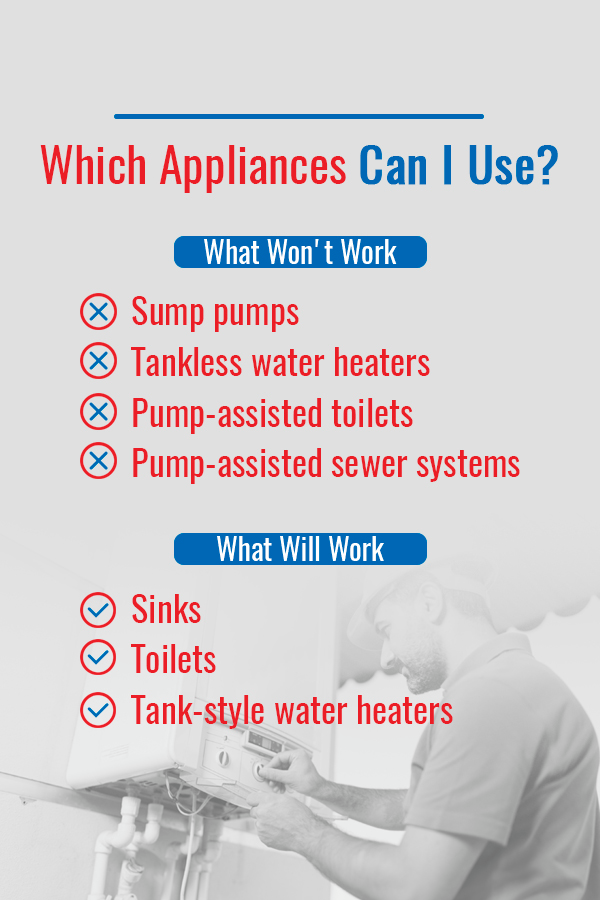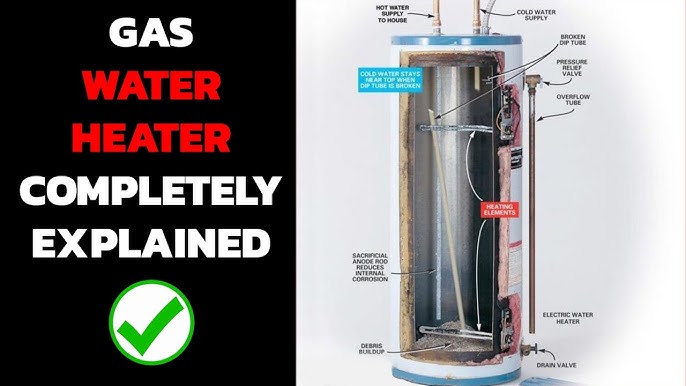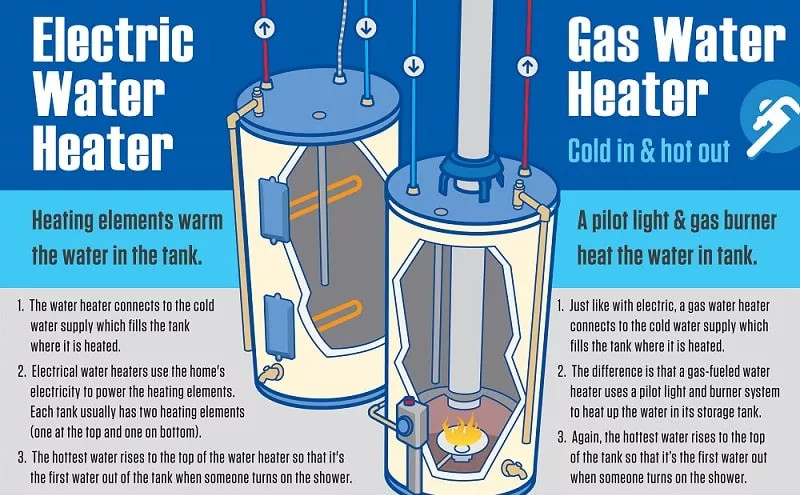Hot water heaters typically do not work during a power outage. Electric models require electricity to function, while gas models may work if they have a pilot light.
A hot water heater is essential for daily comfort, providing hot water for showers, cleaning, and cooking. Many homeowners rely on electric or gas models for their hot water needs. During power outages, the functionality of these heaters can vary significantly.
Electric hot water heaters won’t operate without electricity, leaving users without hot water. Conversely, gas heaters can still provide hot water if they have a standing pilot light. Understanding how your hot water system operates during a power outage can help you prepare and ensure you have access to hot water when needed.
Page Contents
- 1 Introduction To Hot Water Heaters And Power Dependencies
- 2 Impact Of Power Outages On Water Heating Systems
- 3 Gas Vs. Electric Water Heaters In Blackouts
- 4 Alternative Power Solutions For Water Heaters
- 5 Pre-emptive Measures To Mitigate Power Outage Issues
- 6 Manual Operation Of Water Heaters During Outages
- 7 Long-term Solutions For Uninterrupted Hot Water Supply
- 8 Understanding The Limitations Of Water Heaters Without Power
- 9 Emergency Preparedness For Homeowners
- 10 Conclusion: Staying Warm Without Worry
- 11 Conclusion
Introduction To Hot Water Heaters And Power Dependencies
Hot water heaters are essential for many homes. They provide hot water for showers, washing dishes, and other daily tasks. Different types of hot water heaters exist, each with its own power needs.
Here are the main types:
| Type | Power Source |
|---|---|
| Storage Tank | Electricity or Gas |
| Tankless | Electricity or Gas |
| Heat Pump | Electricity |
Electricity plays a key role in heating water. Most heaters rely on electric power for operation. In a power outage, electric heaters will not function. Gas heaters may still work, but some models need electricity for controls.
Impact Of Power Outages On Water Heating Systems
Power outages can stop many hot water heaters from working. Electric water heaters depend on electricity. Without power, you won’t have hot water. Gas heaters may still work, but check the pilot light. A gas heater needs power for the thermostat.
During an outage, keep safety in mind. Avoid using candles near water heaters. Never try to relight a pilot light without guidance. Always check for gas leaks if you smell something unusual. Use flashlights instead of candles for light.
Keep your water heater’s manual handy. It can provide specific instructions for your model. Knowing how to operate it safely can help during tough times.
Gas Vs. Electric Water Heaters In Blackouts
Gas water heaters can work during a power outage. They rely on gas, not electricity. This makes them very useful in blackouts. They provide hot water even when the lights are off.
Some pros of gas water heaters include:
- Hot water during power cuts.
- Faster heating times.
- Lower operational costs.
Cons include:
- Need for gas supply.
- Higher installation costs.
- Safety risks like gas leaks.
Electric water heaters depend on electricity to function. During a blackout, they stop working. This means no hot water until power returns.
Vulnerabilities of electric water heaters are:
- Limited use in emergencies.
- Higher electricity bills.
Alternative Power Solutions For Water Heaters
Generators provide a temporary power source for electric water heaters. They can keep your heater running during a power outage. Choose a generator that matches the heater’s wattage. Proper installation and usage are important for safety.
Battery backups also offer an option for keeping water hot. These systems store energy for later use. Here are some pros and cons:
| Pros | Cons |
|---|---|
| Easy to install | Limited run time |
| Quiet operation | Higher initial cost |
| No fuel needed | Requires regular maintenance |
Understanding these options helps you choose the best solution for your needs.
Pre-emptive Measures To Mitigate Power Outage Issues
Regular maintenance of a hot water heater is crucial. Check the anode rod every year. This part prevents rusting and extends the heater’s life. Flush the tank annually to remove sediment buildup. Sediment can lower efficiency and increase heating costs.
Investing in surge protectors can save your heater. These devices protect against power surges. They help avoid damage during outages. Choose high-quality surge protectors for the best results. Ensure they match the wattage of your heater.
Consider having a backup power source. Generators can keep your water heater running. This option ensures hot water during outages. Always follow safety guidelines when using generators.

Credit: www.mrrooter.com
Manual Operation Of Water Heaters During Outages
To manually ignite a gas heater, follow these steps:
- Turn off the gas valve for safety.
- Locate the pilot light access panel.
- Use a long lighter or match to ignite the pilot light.
- Hold the control button down for a few seconds.
- Release the button after the pilot stays lit.
Safety precautions are crucial during this process:
- Ensure proper ventilation in the area.
- Do not use flammable materials near the heater.
- Keep a fire extinguisher nearby.
- Check for gas leaks before igniting.
- Always read the manufacturer’s instructions.
Long-term Solutions For Uninterrupted Hot Water Supply
Solar water heaters use the sun’s energy. They provide hot water without electricity. These systems are great for eco-friendly living. They work well in sunny areas and save money on bills.
On-demand water heaters heat water only when needed. They do not store hot water. This can save energy and space. They are also known as tankless water heaters. These units can provide hot water during power outages if they run on gas.
| Type | Energy Source | Benefits |
|---|---|---|
| Solar Water Heaters | Solar Energy | Eco-friendly, low cost |
| On-demand Water Heaters | Gas/Electric | Space-saving, energy-efficient |
Understanding The Limitations Of Water Heaters Without Power
Hot water heaters usually rely on electricity or gas to function. During a power outage, many electric heaters stop working completely. Gas heaters may still provide hot water, but only if they have a pilot light. The capacity of a heater during an outage depends on its type.
For electric heaters, the duration of functionality is zero. They cannot heat water without power. On the other hand, gas water heaters can provide hot water for a limited time. The hot water stored in the tank can last for a few hours to a day.
It’s important to remember that water temperature will gradually decrease without heating. Always check the temperature before use, especially during an outage.
Emergency Preparedness For Homeowners
Preparing for a power outage is crucial for homeowners. Start by creating an outage readiness plan. This plan should include important supplies and knowledge.
Essential supplies include:
- Flashlights with extra batteries
- Non-perishable food items
- Water (at least one gallon per person per day)
- First aid kit
- Portable phone charger
Knowledge about your hot water heater is also important. If the power goes out, it may not work. Knowing how to drain it safely can help.
Stay informed about local weather and outages. This can help you prepare better.

Credit: www.youtube.com
Conclusion: Staying Warm Without Worry
Hot water heaters need electricity to work. During a power outage, they usually stop functioning. Some models can work with gas or propane. This means you might still have hot water if the power is out.
Using a tankless water heater can provide hot water even during outages. These units heat water on demand. They are energy-efficient and can save money.
Having a backup system is wise. A generator can keep your heater running. Regular maintenance helps prevent unexpected failures.
| Key Points | Details |
|---|---|
| Electric Units | Stop working during power outages. |
| Gas/Propane Units | May still provide hot water. |
| Tankless Heaters | Offer hot water on demand. |
| Backup Systems | Generators can maintain hot water supply. |
Understanding your water heater helps in emergencies. Knowing the type of heater you have is essential. Stay prepared to enjoy hot water anytime.

Credit: www.plumbersstock.com
Conclusion
A power outage can disrupt many household functions, including your hot water heater. Understanding how your specific model operates during such events is crucial. Always consider alternative heating methods and keep emergency resources handy. Staying prepared ensures you have hot water when you need it most, even during unexpected outages.
